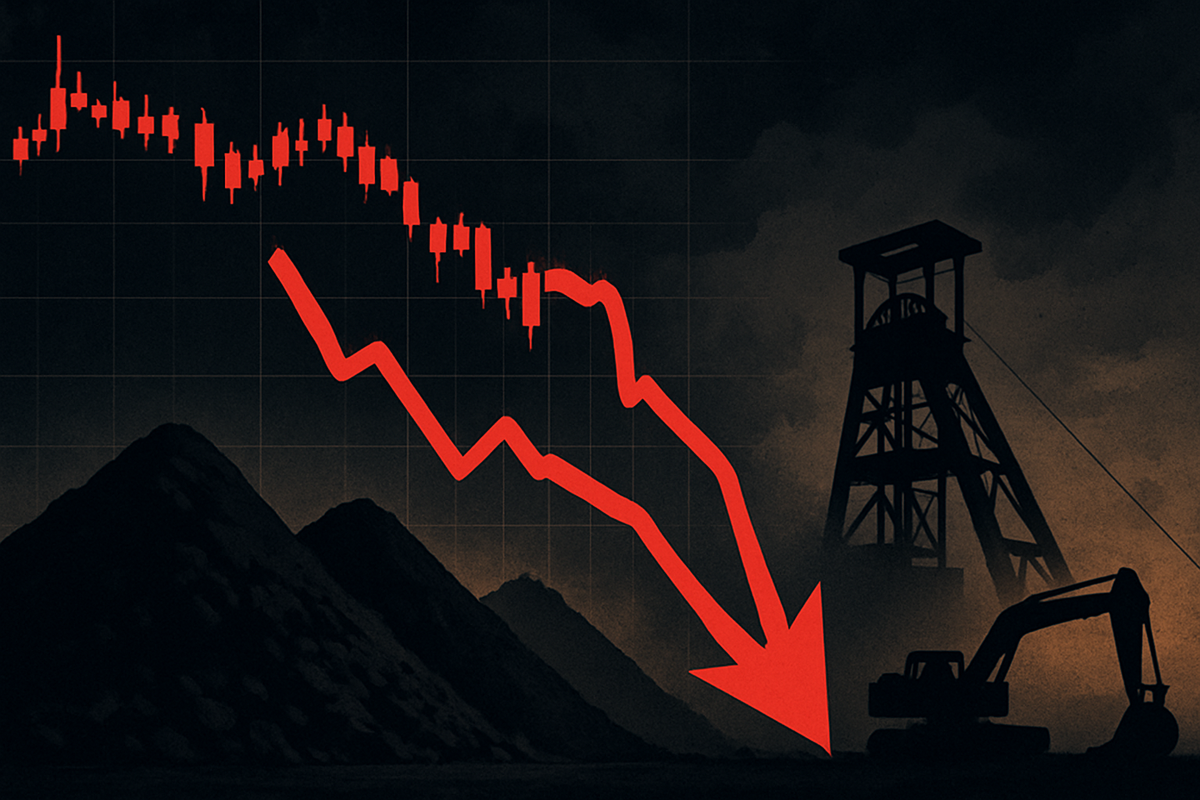
Hong Kong/Shanghai/OTC Markets – October 8, 2025 – Yankuang Energy Group Company Limited (HKEX: 1000, SSE: 600188) experienced a significant stock "gap down" today, with its shares trading on the OTC Markets (OTCMKTS: YZCAY) opening sharply lower. This immediate market reaction underscores growing investor apprehension fueled by a confluence of disappointing financial results, a recent analyst downgrade, and a challenging global coal market outlook. The event signals a potential shift in sentiment towards the Chinese coal giant and raises questions about its near-term performance amidst an evolving energy landscape.
The downturn reflects a broader struggle for the company, which has seen its various listings underperform their respective markets over the past year. Today's gap down on the OTC market, where shares opened at $12.69 after closing at $13.20, represents a substantial initial drop of $0.51 per share, although the stock did show some recovery later in the day. This move is indicative of a market grappling with persistent oversupply in the coal sector and a significant slowdown in demand from key economies like China, putting immense pressure on major producers like Yankuang Energy.
A Cascade of Negative Catalysts
The roots of Yankuang Energy's recent stock decline can be traced through a series of unfavorable developments that have unfolded over recent months. The most immediate catalyst leading up to today's gap down was a decisive downgrade by Zacks Research on Friday, September 26, 2025, which lowered the company's shares from a "hold" to a "strong sell" rating. This analyst sentiment reflects a growing consensus of caution, with the broader analyst community maintaining a "Sell" rating for the company.
Prior to the downgrade, the market had already been digesting a string of disappointing financial reports. On Friday, August 29, 2025, Yankuang Energy announced its latest quarterly earnings, reporting a meager earnings per share (EPS) of $0.28, significantly missing analyst consensus estimates of $0.64 by $0.36. Revenue figures were equally concerning, coming in at $3.27 billion against an expected $7.36 billion. These results followed an earlier first-quarter 2025 report on April 27, 2025, which showed EPS down to CN¥0.27 from CN¥0.39 year-over-year, alongside a 24% revenue decline. The full-year 2024 results, released on March 31, 2025, had already set a somber tone with a 28% decrease in profit and a 7% slide in revenue, compounded by a 6% drop in coal sales in Q1 2025.
Further complicating the picture, the company recently announced a dividend, payable on Monday, November 3, 2025, with an ex-dividend date of Friday, September 12, 2025. While the substantial dividend yield of 913.0% might appear attractive on the surface, the context of reduced payouts and overall financial underperformance suggests that this could be interpreted by investors as a revised capital allocation strategy under duress rather than a sign of robust health. These internal corporate developments are occurring against a backdrop of significant shifts in the global commodity markets, particularly for coal.
Winners and Losers in a Shifting Energy Paradigm
The downturn for Yankuang Energy Group (HKEX: 1000, SSE: 600188, OTCMKTS: YZCAY) is not an isolated event but rather a symptom of broader trends affecting the global energy sector, particularly the coal industry. In this environment, certain companies and sectors stand to lose, while others might find opportunities.
Losers: Clearly, Yankuang Energy Group itself is a primary loser. The sustained pressure on coal prices and demand directly impacts its core business, leading to reduced revenues and profits. The company's significant exposure to thermal coal, which is facing increasing competition from renewable energy sources, makes it particularly vulnerable. Other pure-play coal producers, especially those with high operational costs or heavy reliance on export markets, are also likely to suffer. Companies like China Shenhua Energy Company Limited (HKEX: 1088, SSE: 601088), another major Chinese coal producer, could face similar headwinds, though their diversified energy portfolios (e.g., power generation for Shenhua) might offer some buffer. However, any company with substantial investments in new coal mining projects or long-term contracts tied to high coal prices could see their valuations erode.
Winners (or less impacted): Conversely, companies focused on renewable energy sources stand to gain from the global shift away from fossil fuels. Manufacturers of solar panels, wind turbines, and battery storage solutions, as well as developers of renewable energy projects, could see increased investment and demand. Examples include companies like Longi Green Energy Technology Co. Ltd. (SSE: 601012) in solar or Xinjiang Goldwind Science & Technology Co., Ltd. (HKEX: 2208, SSE: 002202) in wind power. Utilities that are aggressively transitioning their power generation mix towards renewables, reducing their reliance on coal, might also be better positioned. Furthermore, companies involved in energy efficiency solutions or carbon capture technologies, while still nascent, could see increased interest as governments and industries seek to mitigate the environmental impact of remaining fossil fuel use. The decline in coal prices might also offer a temporary cost advantage to industries that still heavily rely on coal for energy or as a raw material, such as certain segments of the steel or cement industries, though this benefit is often offset by environmental pressures and long-term supply uncertainties.
The financial health of these companies will largely depend on their strategic agility in adapting to the global energy transition. Those with diversified portfolios, strong balance sheets, and a clear path towards sustainable energy solutions are more likely to weather the storm and emerge stronger.
Broader Significance in a Transforming Energy Landscape
The recent downturn in Yankuang Energy Group's stock is more than just a company-specific event; it is a potent microcosm of the profound transformation sweeping through the global energy landscape. This event fits squarely into broader industry trends characterized by a relentless push towards decarbonization, the rapid expansion of renewable energy capacity, and a re-evaluation of fossil fuel assets by investors and policymakers alike.
Globally, the International Energy Agency (IEA) has highlighted that while coal demand reached a new record in 2024, it is projected to stabilize or even slightly decline in 2025. The first half of 2025 has already seen a marginal decrease in global coal demand, largely due to weaker electricity demand growth and a surge in renewable energy output, particularly in major consuming nations like China and India. This trend directly impacts major coal exporters and producers, signalling a structural shift rather than a cyclical dip. The projected 27% year-over-year decline in thermal coal prices to around $100 per metric ton in 2025, driven by persistent oversupply and reduced demand, further underscores the challenging environment for coal companies.
The ripple effects of this trend are significant. Competitors, particularly other large state-owned coal enterprises in China, will likely face similar pressures on their revenues and profitability. This could lead to industry consolidation, asset divestitures, or a renewed focus on diversification into other energy sources. International partners, especially those reliant on long-term coal supply contracts, might find themselves renegotiating terms or accelerating their own transition away from coal. For example, countries in Southeast Asia that have historically relied on imported coal for power generation may now find it more economically viable to invest in domestic renewable projects, further reducing demand for seaborne coal.
Regulatory and policy implications are also profound. Governments, particularly in China, are increasingly balancing energy security with environmental targets. While coal remains crucial for China's energy mix, policies promoting domestic renewable energy generation and stricter emissions standards will inevitably curtail future demand for thermal coal. Globally, carbon pricing mechanisms, stricter environmental regulations, and international climate agreements continue to make coal a less attractive investment. Historically, similar shifts in commodity markets, such as the decline of oil prices in the 1980s or the dot-com bubble burst, illustrate how rapidly market sentiment and valuations can change when fundamental industry paradigms are challenged. For coal, the challenge is existential: a world striving for net-zero emissions has a diminishing place for its product.
The Path Ahead: Adaptation and Diversification
The immediate aftermath of Yankuang Energy's stock gap down points to continued volatility and investor scrutiny in the short term. The company will likely face intensified pressure to articulate a clear strategy for navigating the challenging coal market and demonstrating a viable path to sustainable profitability. Short-term possibilities include further downward revisions in analyst forecasts, increased selling pressure from institutional investors divesting from fossil fuel-heavy portfolios, and potential credit rating adjustments if financial performance continues to deteriorate. The market will be closely watching for any announcements regarding production cuts, cost-saving measures, or strategic asset sales.
In the long term, the situation demands significant strategic pivots and adaptations from Yankuang Energy Group (HKEX: 1000, SSE: 600188, OTCMKTS: YZCAY). Relying solely on coal production appears increasingly unsustainable given global energy trends. Potential strategies include aggressive diversification into renewable energy projects, similar to moves made by some international mining giants, or investing in cleaner coal technologies such as coal gasification or carbon capture and storage, though the economic viability and scalability of these remain subjects of debate. The company could also explore opportunities in other critical minerals or infrastructure projects that align with China's broader economic development goals.
Market opportunities might emerge for companies adept at innovation in sustainable energy or those that can acquire distressed coal assets at attractive valuations for eventual repurposing. However, for Yankuang Energy, the primary challenge is to transform its business model to reduce its reliance on a commodity with a declining long-term outlook. Potential scenarios range from a managed decline and eventual nationalization/consolidation within China's state-owned enterprise framework, to a successful, albeit challenging, pivot towards a more diversified energy portfolio. The company's ability to secure financing for such a transition and gain investor confidence will be paramount.
Navigating a Challenging Future
Yankuang Energy Group Company Limited's recent stock gap down serves as a stark reminder of the profound shifts occurring within the global energy markets. The confluence of disappointing financial results, a significant analyst downgrade, and a deteriorating outlook for global coal demand has created a challenging environment for the company. Key takeaways from this event include the increasing vulnerability of pure-play fossil fuel companies to macro-economic and environmental pressures, the growing influence of ESG (Environmental, Social, and Governance) factors on investment decisions, and the accelerating pace of the energy transition.
Moving forward, the market will be keenly assessing Yankuang Energy's strategic response. Investors should watch for concrete plans for diversification, investments in new energy technologies, or a clear strategy for optimizing its existing coal operations for efficiency and profitability in a shrinking market. Any signs of aggressive debt reduction or a re-evaluation of dividend policies in light of financial performance will also be critical indicators. The company's ability to adapt to China's evolving energy policy, which increasingly favors renewables and cleaner energy sources, will be central to its long-term viability.
The lasting impact of this event could be a re-rating of coal companies across the board, reflecting the inherent risks of a sunset industry. For investors, the message is clear: while short-term commodity price fluctuations can offer trading opportunities, the fundamental headwinds facing coal are significant and structural. A comprehensive understanding of a company's long-term strategy and its alignment with global energy trends is more crucial than ever in assessing investment potential in the energy sector.
This content is intended for informational purposes only and is not financial advice





